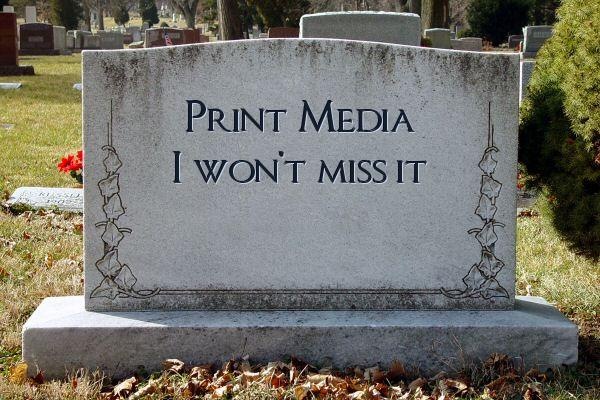Toby and i have been debating and discussing what new media will look like. His post today inspired me to lay down some of my thoughts. A lot of my thinking stems from this article in The Atlantic and Fred’s Post about his reading habits.

The Atlantic post described how the NY Times is dead. With $1 billion in debt, a $400 million dollar loan due in May and only $46 million in cash on hand, it is going down. Even with the $250 million it got yesterday, it cannot continue to exist the way it is. No newspaper can. My beloved Star Tribune declared bankruptcy last too and that’s the beginning of the trend of all papers.
Why are they failing? Because the business model is wrong. They are trying to do too much. They cover things that are commodities. It’s as if every online music service tried to build an mp3 store to compete with iTunes and Amazon. They don’t because those work great. Newpapers try to cover every story: national and international news, sports, entertainment, etc. The local newspaper doesn’t need to cover most of they reports on today because their paper is not going to be the place where the public finds that information. When user’s get online, all of this news is available in other places, for free and in a better, deeper format. For instance:
- National and International news: this is covered by AP, Reuters, and CNN.com
- Entertainment news: this can be found online (RottenTomatoes) or from national news and reviews from individual columnists (Ebert)
- Sports: ESPN.com and bloggers will cover this
If a paper is covering any of these on their own, it is a losing proposition. What’s left? The only thing is see is local news. I think local papers should focus on local news because everything else is a commodity. Even bloggers will be able to fill the gaps left by major journals.
Toby talks in his post about the Huffington Post which i think is a piece of the puzzle but it’s only interesting because they are trying to be a news portal. And i agree. In my mind, most “papers” will shift online and instead of reporting the news, they will be filtering it. And if they don’t, they will die. They better hurry up too, becuase places like the HuffPo are trying to get there first. You can already see how this is happening. Filters are already part of people everyday lives the same way a paper used to be. Technology aggregation and filtering is done at Techmeme, sport aggregation and filtering at ESPN, and news filters like CNN can replace almost any newspaper’s news coverage.
I’m not the only one who thinks this way. More evidence came yesterday when ESPN announced a partnership with TrueHoop to place NBA blogs in their site because they know that they can’t cover everything. You can see how techmeme is the “paper” of choice for Michael Arrington from TechCrunch. He writes:
TechMeme is another four-year favorite. It is the blogosphere’s daily newspaper, and one of the sites we use most often in seeing how stories develop.
Will papers become local news sources? I think that’s all that’s left for them. But they better hurry up because local blogs like LAist.com and DCist.com are already attacking this niche and doing a better job than they are.

![Reblog this post [with Zemanta]](http://img.zemanta.com/reblog_e.png?x-id=d31770bc-5bf3-4fed-87a7-d0c66d46974e)


![Reblog this post [with Zemanta]](http://img.zemanta.com/reblog_e.png?x-id=a1e76c5d-54c6-4a58-9b34-6fef16642dcc)


![Reblog this post [with Zemanta]](http://img.zemanta.com/reblog_c.png?x-id=44e903c1-822c-422a-be14-28ce4dd6a81a)

![Reblog this post [with Zemanta]](http://img.zemanta.com/reblog_e.png?x-id=20055859-65ed-42c7-9853-e3b214ac49d7)

![Reblog this post [with Zemanta]](http://img.zemanta.com/reblog_e.png?x-id=45c87f73-e5fd-4550-8e93-adfac8346957)

![Reblog this post [with Zemanta]](http://img.zemanta.com/reblog_e.png?x-id=1689b027-60e6-4231-b5ce-acaa84335226)

![Reblog this post [with Zemanta]](http://img.zemanta.com/reblog_e.png?x-id=20118aad-87c2-49d8-827b-c6f09eab0c5a)

![Reblog this post [with Zemanta]](http://img.zemanta.com/reblog_e.png?x-id=74cb3ccd-629d-4019-9521-11eff1edf554)

![Reblog this post [with Zemanta]](http://img.zemanta.com/reblog_c.png?x-id=fec54032-b3bb-47ba-bc6a-215f749b7fd9)

![Reblog this post [with Zemanta]](http://img.zemanta.com/reblog_e.png?x-id=f203363d-fd06-4b6c-be4a-f204253f57e0)